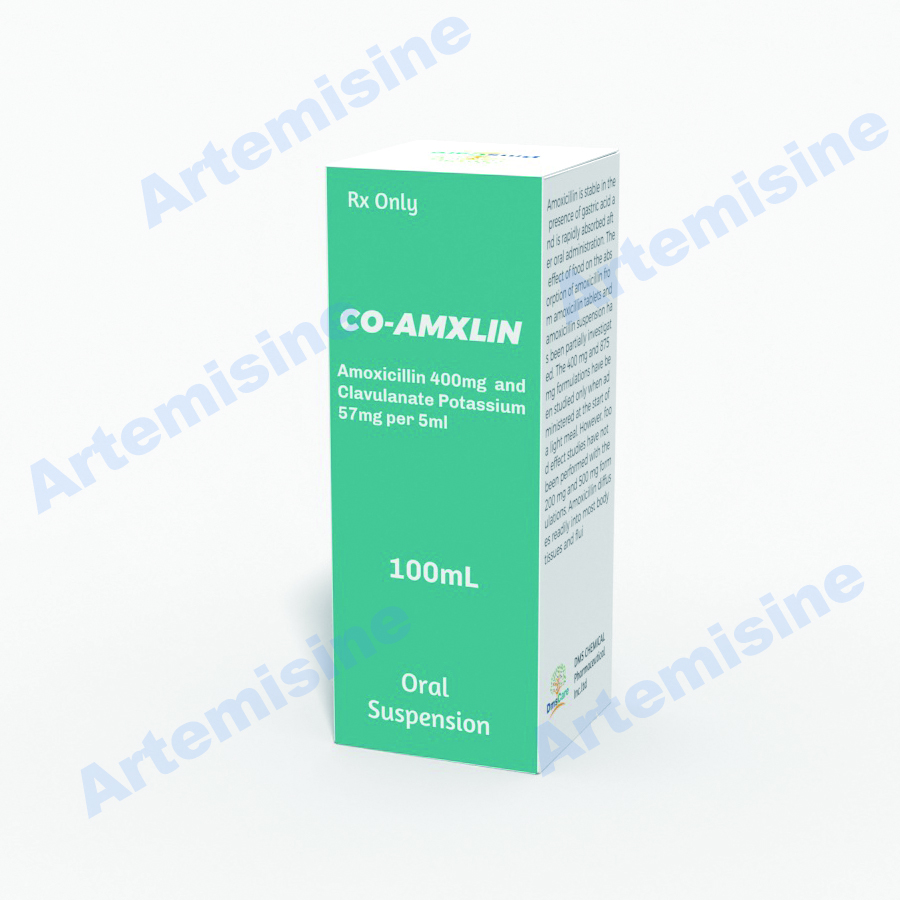Product Description
Products name: CO-AMXLIN( Amoxicillin and Clavulanate Oral Suspension)
Contains:
Amoxicillin / Clavulanate Potassium 600 mg/42.9 mg per 5 mL.
Package:
1 bottle/ box;
Indications and Usage for CO- AMXLIN
CO-AMXLIN is a combination of amoxicillin, a penicillin-class antibacterial, and clavulanate potassium, a beta-lactamase inhibitor, indicated for the treatment of pediatric patients with:
- Recurrent or persistent acute otitis media due to S. pneumoniae (penicillin MICs less than 2 mcg/mL), H. influenzae (including β-lactamase-producing strains), or M. catarrhalis (including β-lactamase-producing strains) characterized by the following risk factors:
– Antibacterial drug exposure for acute otitis media within the preceding 3 months, and either of the following:
1) age 2 years, or younger or
2) daycare attendance.
Limitations of Use
Acute otitis media due to S. pneumoniae alone can be treated with amoxicillin. CO-AMXLIN is not indicated for the treatment of acute otitis media due to S. pneumoniae with penicillin MIC greater than or equal to 4 mcg/mL. Therapy may be instituted prior to obtaining the results from bacteriological studies when there is reason to believe the infection may involve both S. pneumoniae (penicillin MIC less than or equal to 2 mcg/mL) and the β-lactamase-producing organisms listed above.
Usage
To reduce the development of drug-resistant bacteria and maintain the effectiveness of CO-AMXLIN and other antibacterial drugs, CO-AMXLIN should be used only to treat or prevent infections that are proven or strongly suspected to be caused by bacteria.
CO- AMXLIN Dosage and Administration
- Pediatric Patients less than 40 kg: 90 mg/kg/day divided every 12 hours, administered for 10 days.
Dosage Forms and Strengths
For oral suspension: 600 mg/42.9 mg per 5 mL.
Contraindications
- History of a serious hypersensitivity reaction (e.g., anaphylaxis or Stevens-Johnson syndrome) to Amoxicillin and Clavulanate Potassium for oral suspension or any other beta-lactams (e.g., penicillins or cephalosporins).
- History of cholestatic jaundice/hepatic dysfunction associated with Amoxicillin and Clavulanate Potassium for oral suspension.
Warnings and Precautions
- Serious (including fatal) hypersensitivity reactions: Discontinue Amoxicillin and Clavulanate Potassium for oral suspension if a reaction occurs.
- Severe Cutaneous Adverse Reactions (SCAR): Monitor closely. Discontinue if rash progresses.
- Hepatic dysfunction and cholestatic jaundice: Discontinue if signs/symptoms of hepatitis occur. Monitor liver function tests in patients with hepatic impairment
- Clostridioides difficile-associated diarrhea (CDAD) (ranging from mild diarrhea to fatal colitis): Evaluate patients if diarrhea occurs.
- Patients with mononucleosis who receive Amoxicillin and Clavulanate Potassium for oral suspension develop skin rash. Avoid use of the drug in these patients.
Adverse Reactions/Side Effects
The most frequently reported adverse reactions were diaper rash (4%), diarrhea (3%), vomiting (2%), candidiasis (1%), and rash (1%).
Drug Interactions
- Co-administration with probenecid is not recommended.
- Concomitant use of Amoxicillin and Clavulanate Potassium for oral suspension with oral anticoagulants may increase the prolongation of prothrombin time.
- Co-administration with allopurinol increases the risk of rash.
- Amoxicillin and Clavulanate Potassium for oral suspension may rreduce the efficacyof oral contraceptives.
Use In Specific Populations
- Pediatric 3 months to 12 years old: Modify dose according to weight.
- Adults and pediatric patients weighing more than 40 kg: The safety and effectiveness of Amoxicillin and Clavulanate Potassium for oral suspension has not been established.
